Movie Review
 |
 |
 |
 |
 |
 |
 |
A Morbid Tale for an Ungodly Society
of Lemony Snicket's A Series of Unfortunate Events
Elizabeth Anne Lozowski
A reader recently wrote TIA asking about the Netflix series Lemony Snicket's Series of Unfortunate Events. As he became more Catholic, he realized that the movies were "malicious," promoting Freemasonry and moral relativism.
"I have stopped watching them," he writes, "but I cannot convince my family to stop. They always reply 'We're in control...' but they are not. Please, an exposé like the one you made of National Treasures so I can share it with them and others."
Here is our response.
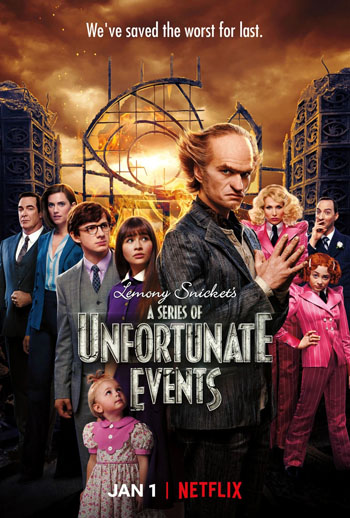 A Series of Unfortunate Events is a 13-book series first published in 1999, later made into a movie in 2004, and finally dramatized in a widely popular three-season Netflix series (2017 to 2019). Daniel Handler, under the pen name of Lemony Snicket, authored the book series that brought to life this dark tale. Young children and adults alike enjoy watching and reading these sardonically addicting stories, though the books were initially intended to be for children.
A Series of Unfortunate Events is a 13-book series first published in 1999, later made into a movie in 2004, and finally dramatized in a widely popular three-season Netflix series (2017 to 2019). Daniel Handler, under the pen name of Lemony Snicket, authored the book series that brought to life this dark tale. Young children and adults alike enjoy watching and reading these sardonically addicting stories, though the books were initially intended to be for children.
The general storyline of all renditions of the series is the following. Three children – Violet, Klaus and Sunny Baudelaire – become orphans after a fire consumes their home and parents. Mr. Poe, a banker in charge of their large inheritance, endeavors to find the children suitable guardians.
The first of these guardians is a distant relative, Count Olaf, who proves to be a scheming madman intent on gaining the Baudelaires’ inheritance and, perhaps, something more. He miserably mistreats the children and, through various dark means, attempts to induce them to hand over their fortune; when they refuse, he devises one means after another to kill them.
The children escape from their wretched captor and are assigned different guardians from their family tree, but frequent accidents, disasters and murders, planned by the mastermind Olaf, slowly dispose of their protectors and place them back in his hands.
This is the modern fiction fed to children these days: tales of confusion, misery and despair in direct contrast to the idealistic and hope-filled children’s stories of the past. Instead of guiding the child’s mind to higher thoughts and desires for heroism and virtue, this new genre of dark fantasy – prevalent in other books as well, such as Goosebumps, The Spiderwick Chronicles, Hunger Games, Miss Peregrine's Home for Peculiar Children, Harry Potter – plays on the evil tendencies of human nature that revel in disorder.
Man’s unseemly attraction for the macabre
Original sin left a mark on the soul that can be perceived in man’s attraction for the macabre. Things that are ugly, scary and secret strangely allure even good-willed persons, arousing their curiosity of and impulse towards evil.
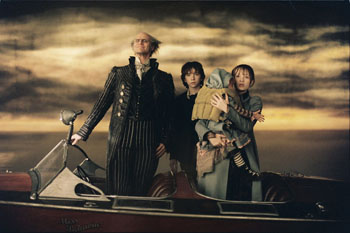
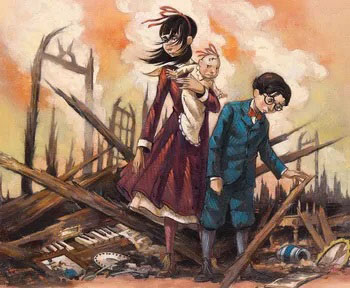 A Series of Unfortunate Events is with gruesome deaths, ghastly characters and disturbing situations to satisfy, or rather agitate, such vain curiosity. There is no happy ending to the story. There is only woe and despair, from beginning to end, as a long chain of dark images are imprinted upon the mind. One example among many is the death of Aunt Josephine, who is pushed into a lake seething with giant leeches.
A Series of Unfortunate Events is with gruesome deaths, ghastly characters and disturbing situations to satisfy, or rather agitate, such vain curiosity. There is no happy ending to the story. There is only woe and despair, from beginning to end, as a long chain of dark images are imprinted upon the mind. One example among many is the death of Aunt Josephine, who is pushed into a lake seething with giant leeches.
Strangely, either when reading the book or watching the Netflix series, the reader/viewer is constantly being told to stop reading or watching the story. The theme song of the Netflix series even intones the warning: “Look away. This show will wreck your evening, your whole life, and your day. Every single episode is nothing but dismay. Ask any stable person, 'Should I watch?'and they will say: 'Look away.'”
Indeed, a stable person instinctively knows it is wrong to watch such things; but once drawn in, he cannot resist the addictive storyline. The strategy is an ingenious plan to keep the viewer watching.
Again, due to man’s corrupted nature, when a person is told not to do something, he obstinately longs to do it, even if it is harmful to his soul. If we, as Catholics, cannot learn to resist such temptations, we will not be able to resist the attacks of the Devil, who is the real mastermind behind stories such as this.
Breaking down the structure & morals of society
One of the central themes promoted in A Series of Unfortunate Events is the idea that children know better than adults. Every adult in the story is ultimately incapable of helping the children, who seem much smarter and wiser because they are "free-thinkers" unbound by the rules of society to which the adults strictly adhere, no matter how ridiculous they may be.
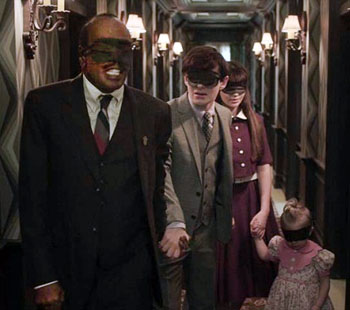 Mr. Poe is the perfect example of an incompetent adult. He continually hands over the children to guardians who are actually Count Olaf in disguise, a deception the children always see through but that Mr. Poe refuses to believe. Stupid, weak and naïve, he places the children in one danger after another, each greater than the one before. In like manner, all of the other guardians and adults who befriend the children cannot overcome their "narrow-mindedness" to understand the children and to resist Count Olaf.
Mr. Poe is the perfect example of an incompetent adult. He continually hands over the children to guardians who are actually Count Olaf in disguise, a deception the children always see through but that Mr. Poe refuses to believe. Stupid, weak and naïve, he places the children in one danger after another, each greater than the one before. In like manner, all of the other guardians and adults who befriend the children cannot overcome their "narrow-mindedness" to understand the children and to resist Count Olaf.
It should come as no surprise that a book that undermines authority would also endorse sodomy and other immoralities. The businessmen “Sir” and Charles who appear in Book Four run the “Miserable Mill” together.
“Sir” is a very manly figure who does all of the heavy work, while Charles is timid, doing the every bidding of “Sir,” including the housework. Although the book gives only subtle hints about their true "relationship," the Netflix series is very explicit that the two men are a sodomite couple.
Similarly, one of the villainous side characters is the Henchperson of Indeterminate Gender, an androgynous character. Although in the book this person is portrayed as silent and sinister, the Netflix series (with the consent of the author) makes a sympathetic depiction, showing ‘it’ speaking out for social justice issues and gender studies.
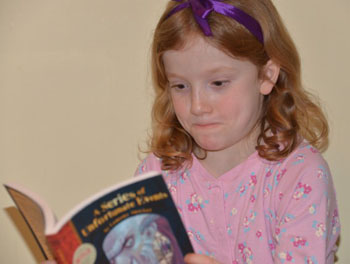 The deficiencies of traditional authorities and moral structures leave the reader/viewer with a very uneasy feeling that laws and commandments are unnecessary. Consequently, moral relativism becomes law.
The deficiencies of traditional authorities and moral structures leave the reader/viewer with a very uneasy feeling that laws and commandments are unnecessary. Consequently, moral relativism becomes law.
The Baudelaire children continually find themselves in morally gray situations that require them to do questionable things in order to survive. The lines between good and evil are no longer distinguishable: Even Count Olaf can be almost pardoned for his crimes because it was the murder of his parents that "forced" him into a villainous life.
What the children learn is that no one is entirely good and perfection is unattainable. If, therefore, there is neither good nor evil, as the series proposes, then the purpose of life cannot be to achieve goodness and practice virtue. Rather, the goal is to live together in harmony with all people, with no distinction of race, gender or virtue. It is to “make the world a quieter place” through the hand of Secret Societies.
The promotion of Freemasonry
The Volunteer Fire Department, known as VFD, is a Secret Society to which the Baudelaires’ parents belonged and which plays a prominent role in the struggles of the children. While extinguishing actual fires like a real fire department, the main goal of VFD is to extinguish figurative fires in order to “make the world a quieter place.”
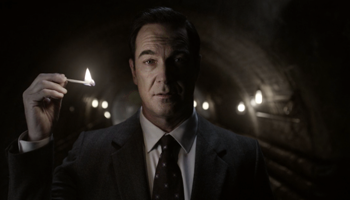 Lemony Snicket describes the VFD: “Our members are found in all nations and classes, and all through the ages, and there is a secret understanding between us when we meet. We represent the true human tradition, the one permanent victory over cruelty and chaos. We're an invincible army, but not a victorious one.”
Lemony Snicket describes the VFD: “Our members are found in all nations and classes, and all through the ages, and there is a secret understanding between us when we meet. We represent the true human tradition, the one permanent victory over cruelty and chaos. We're an invincible army, but not a victorious one.”
The organization is secretive, using codes and disguises and never fully explaining the purpose of its existence, about which all of its members seem to disagree. Indeed, the purpose of the VFD is as vague and ambiguous as its interests are broad and all-encompassing.
Only one thing is certain: the VFD will always be keeping an eye on the world, as the insignia composed of the three letters indicates. Clearly, VFD is a form of fictionalized Freemasonry.
 Just as the Secret Forces of today fight amongst themselves, one side peace-loving and the other force-driven, the VFD had a schism some time before the beginning of the narrative: It split into the Fire-Fighting side and the Fire-Starting side, the latter of which Count Olaf is a leading member and which accounts for his cruelty.
Just as the Secret Forces of today fight amongst themselves, one side peace-loving and the other force-driven, the VFD had a schism some time before the beginning of the narrative: It split into the Fire-Fighting side and the Fire-Starting side, the latter of which Count Olaf is a leading member and which accounts for his cruelty.
Without the presence of this Secret Society in A Series of Unfortunate Events, the storyline would not be nearly as interesting. Vital to the running of the world, the VFD is intriguing in its use of secrecy and fraternity, tools used by Freemasonry to ensnare its members.
Such a promotion of Freemasonry is not harmless. On the contrary, it corrupts the reader/viewer into accepting the Secret Forces in the modern world. Perhaps this is one reason the series appeals to adults as well as children.
An unfortunate ending: Rejection of God & despair
In a world run by Freemasonry, God is ultimately rejected, a rejection clearly seen in the ending of the series.
The last trial of the Beadelaires leaves them stranded with Count Olaf on an idyllic island ruled by Ishmael, an old man who sets rules to keep the people from being corrupted by the outside world. Ishmael assures the children, however, that these rules are not forced upon anyone, alluding to man’s free will.
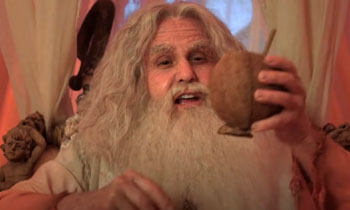
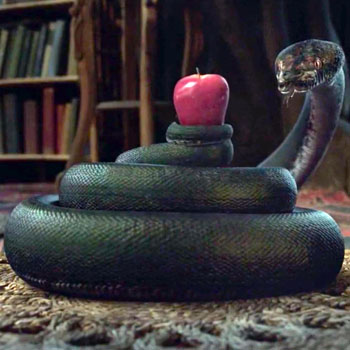 Unlike the rational and intelligent Baudelaire children, the people on the island are simple and ignorant, wearing white robes and drinking a coconut drink containing opium, secretly added by Ishmael. This insinuation clearly refers to Karl Marx’s quote, “Religion is the opium of the people.”
Unlike the rational and intelligent Baudelaire children, the people on the island are simple and ignorant, wearing white robes and drinking a coconut drink containing opium, secretly added by Ishmael. This insinuation clearly refers to Karl Marx’s quote, “Religion is the opium of the people.”
Troubles begin on the island when Count Olaf lets loose a deadly, contagious disease that infects all the island's inhabitants, including the children. The only known cure is horseradish, which is not found on the island.
But on this island of paradise there is a great tree with exotic apples, a forbidden fruit. As the children languish in sickness, a deadly serpent picks an apple from the tree and gives it to them. They eat it and are cured. Ishamel forbids his followers to eat the apples, and they blindly follow him onto a boat in search of horseradish, while the deadly serpent swims after them carrying a tempting apple in its mouth.
The allusion to the Garden of Eden and the Tree of Knowledge is all too apparent, and the mockery of God is blatant, implying that He is an unreasonable dictator who brainwashes His followers. This offense against God should not be tolerated by any good Catholic. (2)
The Great Unknown, a mysterious entity said to be more evil than Olaf, is an ominous monster feared by all, precisely because it is unexplainable. It makes its appearance in an illustration at the very end of the book as a question mark in the sea. Although the Great Unknown is not shown at the end of the Netflix series, Lemony Snicket alludes to it when he narrates “though, of course, there are still unknowns.”
Both references point to the aim of A Series of Unfortunate Events: to destroy certainty, truth and faith. What happens after death is unknown, the purpose of life is unknown; indeed, there is no point in living.
Those who have watched the Series or read the books can likewise ask themselves why they spent useless hours on such a despairing a story. Even should a Catholic reject the dark messages of this series, the seeds of doubt planted in his mind will be very difficult to uproot.
The last words of Count Olaf fittingly proclaim these fatalist principles: “Man hands on misery to man. It deepens like a coastal shelf. Get out as early as you can. And don't have any kids yourself.”
So says the reprobate who rejects God’s mercy and love, without which there is no true peace or happiness. If we wish to be among the elect, we must not seek entertainment in the snares of the reprobate. We must reject such unwholesome entertainment and do all that we can to save others from falling into the trap.
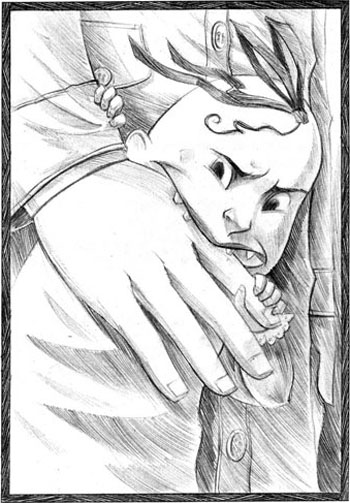

"I have stopped watching them," he writes, "but I cannot convince my family to stop. They always reply 'We're in control...' but they are not. Please, an exposé like the one you made of National Treasures so I can share it with them and others."
Here is our response.

A dark and despairing vision of the world - made for children
The general storyline of all renditions of the series is the following. Three children – Violet, Klaus and Sunny Baudelaire – become orphans after a fire consumes their home and parents. Mr. Poe, a banker in charge of their large inheritance, endeavors to find the children suitable guardians.
The first of these guardians is a distant relative, Count Olaf, who proves to be a scheming madman intent on gaining the Baudelaires’ inheritance and, perhaps, something more. He miserably mistreats the children and, through various dark means, attempts to induce them to hand over their fortune; when they refuse, he devises one means after another to kill them.
The children escape from their wretched captor and are assigned different guardians from their family tree, but frequent accidents, disasters and murders, planned by the mastermind Olaf, slowly dispose of their protectors and place them back in his hands.
This is the modern fiction fed to children these days: tales of confusion, misery and despair in direct contrast to the idealistic and hope-filled children’s stories of the past. Instead of guiding the child’s mind to higher thoughts and desires for heroism and virtue, this new genre of dark fantasy – prevalent in other books as well, such as Goosebumps, The Spiderwick Chronicles, Hunger Games, Miss Peregrine's Home for Peculiar Children, Harry Potter – plays on the evil tendencies of human nature that revel in disorder.
Man’s unseemly attraction for the macabre
Original sin left a mark on the soul that can be perceived in man’s attraction for the macabre. Things that are ugly, scary and secret strangely allure even good-willed persons, arousing their curiosity of and impulse towards evil.

Count Olaf devises plan after plan to kill the children; above, the movie; below, the book

Strangely, either when reading the book or watching the Netflix series, the reader/viewer is constantly being told to stop reading or watching the story. The theme song of the Netflix series even intones the warning: “Look away. This show will wreck your evening, your whole life, and your day. Every single episode is nothing but dismay. Ask any stable person, 'Should I watch?'and they will say: 'Look away.'”
Indeed, a stable person instinctively knows it is wrong to watch such things; but once drawn in, he cannot resist the addictive storyline. The strategy is an ingenious plan to keep the viewer watching.
Again, due to man’s corrupted nature, when a person is told not to do something, he obstinately longs to do it, even if it is harmful to his soul. If we, as Catholics, cannot learn to resist such temptations, we will not be able to resist the attacks of the Devil, who is the real mastermind behind stories such as this.
Breaking down the structure & morals of society
One of the central themes promoted in A Series of Unfortunate Events is the idea that children know better than adults. Every adult in the story is ultimately incapable of helping the children, who seem much smarter and wiser because they are "free-thinkers" unbound by the rules of society to which the adults strictly adhere, no matter how ridiculous they may be.

The naïve Mr. Poe never sees the dangers
It should come as no surprise that a book that undermines authority would also endorse sodomy and other immoralities. The businessmen “Sir” and Charles who appear in Book Four run the “Miserable Mill” together.
“Sir” is a very manly figure who does all of the heavy work, while Charles is timid, doing the every bidding of “Sir,” including the housework. Although the book gives only subtle hints about their true "relationship," the Netflix series is very explicit that the two men are a sodomite couple.
Similarly, one of the villainous side characters is the Henchperson of Indeterminate Gender, an androgynous character. Although in the book this person is portrayed as silent and sinister, the Netflix series (with the consent of the author) makes a sympathetic depiction, showing ‘it’ speaking out for social justice issues and gender studies.

Teaching children there is no true good or evil
The Baudelaire children continually find themselves in morally gray situations that require them to do questionable things in order to survive. The lines between good and evil are no longer distinguishable: Even Count Olaf can be almost pardoned for his crimes because it was the murder of his parents that "forced" him into a villainous life.
What the children learn is that no one is entirely good and perfection is unattainable. If, therefore, there is neither good nor evil, as the series proposes, then the purpose of life cannot be to achieve goodness and practice virtue. Rather, the goal is to live together in harmony with all people, with no distinction of race, gender or virtue. It is to “make the world a quieter place” through the hand of Secret Societies.
The promotion of Freemasonry
The Volunteer Fire Department, known as VFD, is a Secret Society to which the Baudelaires’ parents belonged and which plays a prominent role in the struggles of the children. While extinguishing actual fires like a real fire department, the main goal of VFD is to extinguish figurative fires in order to “make the world a quieter place.”

Lemony Snicket explains the Secret Society
The organization is secretive, using codes and disguises and never fully explaining the purpose of its existence, about which all of its members seem to disagree. Indeed, the purpose of the VFD is as vague and ambiguous as its interests are broad and all-encompassing.
Only one thing is certain: the VFD will always be keeping an eye on the world, as the insignia composed of the three letters indicates. Clearly, VFD is a form of fictionalized Freemasonry.

The VFD's symbol – the all-seeing Horus eye – is found throughout the movie; even the island becomes the eye
Without the presence of this Secret Society in A Series of Unfortunate Events, the storyline would not be nearly as interesting. Vital to the running of the world, the VFD is intriguing in its use of secrecy and fraternity, tools used by Freemasonry to ensnare its members.
Such a promotion of Freemasonry is not harmless. On the contrary, it corrupts the reader/viewer into accepting the Secret Forces in the modern world. Perhaps this is one reason the series appeals to adults as well as children.
An unfortunate ending: Rejection of God & despair
In a world run by Freemasonry, God is ultimately rejected, a rejection clearly seen in the ending of the series.
The last trial of the Beadelaires leaves them stranded with Count Olaf on an idyllic island ruled by Ishmael, an old man who sets rules to keep the people from being corrupted by the outside world. Ishmael assures the children, however, that these rules are not forced upon anyone, alluding to man’s free will.

Ishmael gives opium to control his people; below, a serpent offers an apple to cure a deadly disease but Ishmael forbids the people to take it

Troubles begin on the island when Count Olaf lets loose a deadly, contagious disease that infects all the island's inhabitants, including the children. The only known cure is horseradish, which is not found on the island.
But on this island of paradise there is a great tree with exotic apples, a forbidden fruit. As the children languish in sickness, a deadly serpent picks an apple from the tree and gives it to them. They eat it and are cured. Ishamel forbids his followers to eat the apples, and they blindly follow him onto a boat in search of horseradish, while the deadly serpent swims after them carrying a tempting apple in its mouth.
The allusion to the Garden of Eden and the Tree of Knowledge is all too apparent, and the mockery of God is blatant, implying that He is an unreasonable dictator who brainwashes His followers. This offense against God should not be tolerated by any good Catholic. (2)
The Great Unknown, a mysterious entity said to be more evil than Olaf, is an ominous monster feared by all, precisely because it is unexplainable. It makes its appearance in an illustration at the very end of the book as a question mark in the sea. Although the Great Unknown is not shown at the end of the Netflix series, Lemony Snicket alludes to it when he narrates “though, of course, there are still unknowns.”
Both references point to the aim of A Series of Unfortunate Events: to destroy certainty, truth and faith. What happens after death is unknown, the purpose of life is unknown; indeed, there is no point in living.
Those who have watched the Series or read the books can likewise ask themselves why they spent useless hours on such a despairing a story. Even should a Catholic reject the dark messages of this series, the seeds of doubt planted in his mind will be very difficult to uproot.
The last words of Count Olaf fittingly proclaim these fatalist principles: “Man hands on misery to man. It deepens like a coastal shelf. Get out as early as you can. And don't have any kids yourself.”
So says the reprobate who rejects God’s mercy and love, without which there is no true peace or happiness. If we wish to be among the elect, we must not seek entertainment in the snares of the reprobate. We must reject such unwholesome entertainment and do all that we can to save others from falling into the trap.

One gruesome incident after another...

Posted April 27, 2022
______________________
______________________





